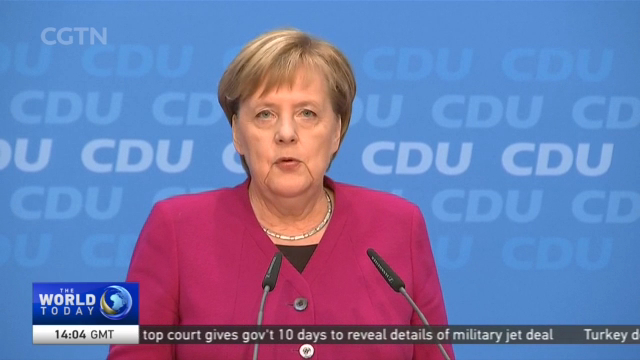
22:24, 31-Oct-2018
German Politics: Angela Merkel to not run again for party leadership or chancellor
Updated
22:18, 03-Nov-2018
03:31

German Chancellor Angela Merkel has announced she will stand down as the country's leader at the next parliamentary elections in 2021. She also said she will not seek re-election as president of the country's ruling Christian Democratic Union or CDU after 18 years of heading the center-right party. Her announcement comes after a series of political crises and regional votes rocked her fragile coalition. Our correspondent Natalie Carney looks at what this means for Germany and the European Union.
Angela Merkel is calling it quits, opening the path to what she calls "a new chapter".
ANGELA MERKEL GERMAN CHANCELLOR "I will not be running for president at the next CDU congress in Hamburg in December. And this fourth term is my last term as Chancellor of Germany. In the 2021 parliamentary elections, I will not run as a candidate for the Chancellery, or for the Bundestag, or for any other office."
Her announcement made headlines globally, prompting some world leaders to stop and recognize her accomplishments during her four terms as Germany's chancellor.
EMMANUEL MACRON FRENCH PRESIDENT "She's been at the head of her party for 18 years and she's faced a number of challenges, the migration crisis and the financial crisis. She's never forgotten the values of Europe and she has led her country with great courage."
Merkel is known best for developing her country into a stable and reliable world power, but in recent years the chancellor's popularity has suffered some painful blows.
NATALIE CARNEY MUNICH, GERMANY "Angela Merkel's sister party here in Bavaria, the CSU, suffered significant losses in state elections earlier this month. Then her own party the CDU lost in polls in the central state of Hessen. Many attribute these defeats to a 2015 decision to open up the country's borders to a large number of migrants, a move that not only affected Germany, but much of Europe."
State elections across the country saw a rise in support for the center left Green party and the far right Alternative for Deutschland or AFD.
CLEMENS FUEST, PRESIDENT IFO INSTITUTE FOR ECONOMIC RESEARCH "When she opened the border, this alienated a lot of people in her own party and it opened the door for the AFD, so for the first time, we have a big party to the right of the CDU, and this has really shaken her power base."
Her failure to form a coalition with the Green party and the liberal Free Democratic Party following federal elections last year was also seen as a nail in her political coffin. Speculation about who will succeed her ranges from a political moderate close to Merkel to a political novice. While Germans are preparing for big changes and a period of political instability, change at Germany's helm could also provide the EU with a pro-active leader they hope will reunite the bloc.
CLEMENS FUEST, PRESIDENT IFO INSTITUTE FOR ECONOMIC RESEARCH "The fragility of the EU will increase in the short term because Merkel will be perceived as something of a lame duck so she will not be able to act on behalf of the EU. At the same time, Merkel has always been perceived as someone leading from behind, not someone really pushing EU reforms. So in the end, this could be an opportunity."
Merkel's decision to step back comes with a shift in the country's political landscape. The biggest challenge now, over her last three years in politics, will be to maintain stability and reliability in Germany. Natalie Carney, CGTN, Munich.

SITEMAP
Copyright © 2018 CGTN. Beijing ICP prepared NO.16065310-3
Copyright © 2018 CGTN. Beijing ICP prepared NO.16065310-3